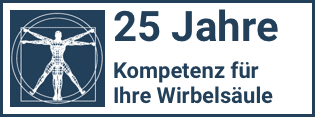Treatment of Neck Pain at the Orthopaedist in Munich
One in two people suffers from neck pain at least once in their lives. Every seventh adult even suffers from acute neck pain that also radiates further into the back of the head or the shoulders. The cause is often only simple muscle tension. However, if the neck goes completely on strike and the throat stiffens up, every head movement becomes torture. The good news: Targeted treatment can bring rapid relief as soon as the causes of the (severe) neck pain are clarified. Here you can find out all you need to know about the causes, symptoms and also prevention of neck pain as well as the treatment possibilities.
What causes neck pain?

In most cases, the problems are caused by poor posture owing to strain on one side of the body or a lack of exercise, because: Cervical vertebrae are extremely sensitive! The tissue around the cervical vertebrae, particularly the muscles at the throat, need to be well supplied with blood and thereby kept warm. Draughts, open windows or temperatures that are too low, as well as lack of exercise, mean that the neck area gets too cold and the neck muscles of the cervical vertebrae are not supplied with blood any more. The result of muscle tension: a stiff neck, vertebrae cannot move as freely any more, first symptoms appears and the risk of an injury grows.
If there is no relief through warmth and relaxation, the stressed muscles in the back, neck and shoulder area gradually shorten and stiffen over time. A further critical factor is stress, which makes the tension problems even worse or can even trigger them on its own. Cervical vertebrae problems are, therefore, typical for people who spend a lot of time in their cars and at their computers, and who are under a lot of stress.

Further possible causes of neck pain can be:
- Wrong sleep position
- Incorrect lifting
- Misalignment of the spine (scoliosis)
- Injuries of the cervical spine (accident)
- Spinal disc herniation
- Age-related degeneration (wear and tear)
- Osteoporosis
What are the symptoms of neck pain?
Pain can return at sporadic intervals. The pain is regarded as acute if it lasts up to three weeks. If the neck pain lasts four to twelve weeks it is known as sub-acute. The symptoms are classified as chronic if they last more than twelve weeks.
There are many different symptoms: Pain when turning the head, a tugging sensation at the back of the head, dizziness or a stiff neck are only a few of the typical signs. If the muscles in the back, neck and shoulder area are tense, most sufferers will experience unpleasant headaches. It is difficult for them to move their heads properly and their shoulders ache. Even nausea is a possible sign of muscle tensions. If dizziness also occurs alongside neck pain, the cause can be a trapped nerve.
How is neck pain treated?
If the neck pain is caused by muscle tension, this normally subsides by itself after a few days. If you are suffering from severe symptoms or long-lasting to chronic neck pain, you should seek the advice of an experienced orthopaedic specialist:
Rapid help to combat mild neck pain:
- Neck massage
- Heat applications
- Exercise
- Pain-relieving medication
We focus on the treatment of all kinds of back pain and, therefore, also have a whole range of therapies available for the treatment of neck pain. During a detailed doctor-patient consultation followed by a physical examination at our premises, we are able to decide, together with you, which treatment options will lead to the desired result. The aim of the treatment is always to alleviate your pain and enable you to live your life without limitations – one example:

For tension-related head, neck and back pain we use a new, innovative therapy with muscle relaxants. During this procedure, we inject tiny amounts of the active ingredient into the painful muscle stiffness, the so-called trigger points. We use extremely thin cannulae for the injections, meaning that they can be carried out almost pain-free. Thanks to the therapy with muscle relaxants, the muscle is lightly and temporarily paralysed meaning that the tension-related pain disappears. The noticeable effects start two to ten days after the injection and usually last for three to six months.
How to prevent neck pain and muscle tension
You can usually prevent neck pain and neck tension with targeted exercises and by following some tips:
- Avoid draughts on unprotected skin
- Avoid poor body posture by ensuring you have an ergonomic workplace
- Change your sitting position more often (put padding in your office chair to lean your back on) as this prevents muscle tension
- Avoid the so-called telephone-clamp (clamping the telephone receiver between your head and shoulder) and use a hands-free system or a headset instead
- Never carry heavy loads on one side of your body but divide the weight on both sides as equally as possible
- Ensure that you get regular exercise and incorporate some neck exercises into your daily routine
- Reduce stress and relieve stress actively, for example through yoga or autogenic training
- Sleeping in the correct position relaxes the neck: If you suffer from neck pain you should take a closer look at the place where you sleep. Because with the help of a good pillow and a suitable mattress, it is possible to get fast relief. If you sleep on your stomach, it is best if you do without a pillow; if you sleep on your side, use a neck support pillow with different padded zones that fill the space between your ear and shoulder


We are here for you!
jameda review from 12/2018
Wiltrud Rakel, OP spinal canal stenosis, 2018.
"A competent and very confident statement at diagnosis, "golden hands" at surgery WS canal stenosis. Thank you Dr. Hadi for a new pain free life.
Your Wiltrud Rakel"






